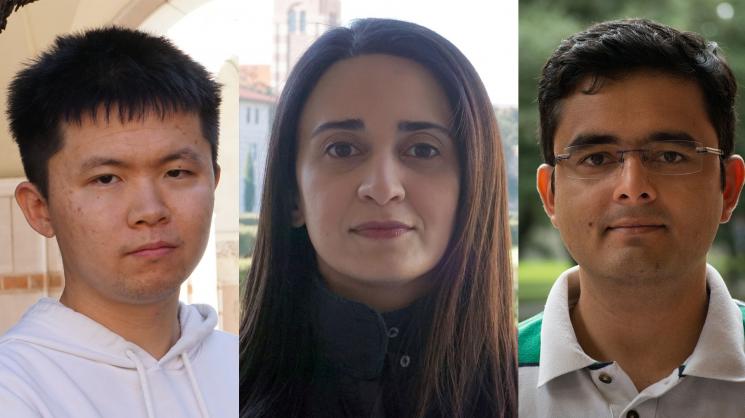Three Rice University Computer Science graduate students were recently awarded research fellowships. Keren Zhou and Afsaneh Rahbar received fellowships administered by the Ken Kennedy Institute and Abhinav Verma received a J.P. Morgan PhD Fellowship.
Zhou, who received the ExxonMobile Graduate Fellowship, is a third year PhD student advised by John Mellor-Crummey. Zhou’s research focuses on building a performance tool to measure, analyze and provide optimization suggestions for applications written for compute nodes equipped with both conventional processor and highly-parallel Graphics Processing Units (GPUs).
He said the goal of his work is to make performance tuning easy, even for application developers who are not experts on programming GPUs.
“GPU vendors do not provide tools that satisfy the needs of HPC application developers,” said Zhou. “Existing performance tools do not associate performance metrics for functions that execute on GPUs with the calling context in which these functions are invoked. Our tool provides a complete profile view that enables users to understand a program's performance by providing calling contexts that span both CPU and GPUs.
“In addition, current tools only describe performance problems at a high level without pointing out problematic lines or ranking optimization effects. Our tool combines GPU samples, GPU metrics, and program structure to identify promising optimizations strategies and estimate their impact.”
Rahbar, a fifth year PhD student advised by Eugene Ng, received the Andrew Ladd Graduate Fellowship. Her research interests have spanned formal methods, programming languages, and compilers, but her first goal was to help others learn about these areas.
"I was always passionate about being a teacher,” she said. “In my undergraduate program, the course I enjoyed the most was Compilers and thought ‘That’s what I like to teach in the future.’
“At UT SA, I became intrigued by the elegant ideas I encountered in programming languages and formal methods, and decided to do research in that domain. My advisor, Dr. Von Ronne, gave me two books to read, one of them was “Engineering: A Compiler” by Keith Cooper and Linda Torczon. I learned about Rice University by that book and thought how great would it be to study there. I could see how working in an environment with language designers like Prof. Cartwright, language implementers like Prof. Cooper, and formal methods researchers like Prof. Vardi would set up the right kind of environment for me and my work. At Rice, I first worked on how to automatically generate proof and prove the correctness of programs. Now I am working in the computer networks domain and how to optimize broadcast performance in Datacenters under the supervision of Dr. Eugene Ng.”
She said broadcast has cemented itself as a fundamental communication pattern common to many big data applications. In particular, big data broadcast traffic in data centers is on the rise.
“Continual reliance on application-level overlays for broadcast data transmission is not a tenable position in the long run. The alternative is in-network broadcast. My research, improves broadcast performance by up to an order of magnitude, effectively boosting application performance. A few of the frameworks that can benefit from it are OpenMPI (a Message Passing Interface library), and Spark (a distributed general-purpose cluster-computing framework). In my work, we explored how bandwidth resources should be allocated to support in-network multicast in data center networks. We propose a novel network architecture that builds a parallel network dedicated to broadcast traffic, using a small number of switch ports that are often left unused in today's data center networks. It connects these ports via inexpensive optical devices in a fully decentralized manner, resulting in a symmetric topology that is highly scalable.
“In the future, I would like to design a project that combines all my expertise including formal methods, programming languages, distributed systems, and computer networks."
Fourth year graduate student Abhinav Verma is advised by Swarat Chaudhuri. Verma received a J.P. Morgan PhD Fellowship through a program intended to support novel and impactful thesis work of PhD students and enable those students to engage with research professionals at J.P. Morgan.
Verma’s research lies at the intersection of machine learning and program synthesis. His aim is to build the next generation of safe and interpretable artificial intelligence (AI) models by synthesizing policies through reinforcement learning.
He said, “Specifically, my work focuses on programmatically verifiable and interpretable learning: solving learning tasks using models that can be expressed as programs in a high-level domain-specific language and provably safe and human interpretable by design.”
In addition to his research interests, Verma is also an entrepreneur. He co-founded AuntyCook, a food services company in India, and attributed the concept for the company to his passion for problem-solving.
Verma said, “The business was based on an innovative idea that provided an online platform for homemakers to sell prepackaged meals to professionals and senior citizens. The idea worked towards bridging the gap between the traditional and new India using technology and harnessed the tremendous power of the Internet to make a significant economic impact by providing an extra source of income for middle-class families.”

